The Effectiveness of the Introduction, Connection, Application, Reflection, Extension (ICARE) Learning Model in Improving Higher Order Thinking Skills (HOTS) of Junior High School Students
Abstract
The importance of higher order thinking skills (HOTS) in the 21st century is undeniable, but the fact is that students HOTS abilities in Indonesia are still low. This study aims to analyze the effectiveness of the Introduction, Connection, Application, Reflection, Extension (ICARE) learning model in enhancing students higher-order thinking skills (HOTS) at the junior high school level. The study adopts a quantitative approach using a quasi experimental method. The design employed is a nonequivalent control group design, involving two classes: an experimental group and a control group. The study was conducted in the seventh grade of SMP N 2 Mertoyudan, using purposive sampling for sample selection. The research instruments consisted of eight essay questions for the pretest and posttest, which had been validated for validity and reliability. Data were analyzed using the Independent Sample t-Test and N-Gain. The results of this study showed a significant difference in higher-order thinking skills between the experimental and control classes. Based on the Independent Sample t-Test, there was a clear difference in the posttest scores of both classes with a significance level of 0.000. Additionally, the average N-Gain score for the experimental class was 0.56, while the control class scored only 0.31. From these findings, it can be concluded that the ICARE model is effective in enhancing higher order thinking skills among junior high school students.
Downloads
References
Anshori, F. Pengaruh Intensitas Pendampingan Guru Dan Perhatian Orang Tuaterhadap Pemahaman Materi Siswa. Program Magister Pendidikan Agama Islamfakultas Ilmu Tarbiyah Dan Keguruan Uin Walisongo Semarang. (2021).
Azizah, N., Huwaida, J., & Khadafi, K. Penerapan Model Pembelajaran ICARE (Introduction, Connection, Applycation, Reflection & Extendsion) untuk Meningkatkan Ranah Psikomotorik Siswa Pada Materi Fikih di Pondok Pesantren Darul Fikri, Ponorogo. Fordetak: Seminar Nasional Pendidikan: Inovasi Pendidikan Di Era Society 5.0, 186–190. (2022).
Desiriah, E., & Setyarsih, W. Tinjauan Literatur Pengembangan Instrumen Penilaian Kemampuan Berpikir Tingkat Tinggi (HOTS) Fisika di SMA. Orbita: Jurnal Hasil Kajian, Inovasi, Dan Aplikasi Pendidikan Fisika, 7(1). (2021).
Destari, R., Siahaan, P., & Efendi, R. (2021). Efektivitas Model ICARE untuk Meningkatkan Keterampilan Berpikir Kreatif Alat Optik. Orbita: Jurnal Hasil Kajian, Inovasi, dan Aplikasi Pendidikan Fisika, 7(1).
Devi, S. S., Munawaroh, F., Hadi, W. P., & Muharrami, L. K. Profil Kemampuan Berpikir Kretif Siswa Setelah Pembelajaran Guided Inquiry dengan Metode Pictorial Riddle. Natural Science Education Research (NSER), 2(1), 40-47. (2019).
Gunawan, I., & Palupi, A. R. Taksonomi Bloom–revisi ranah kognitif: kerangka landasan untuk pembelajaran, pengajaran, dan penilaian. Premiere educandum: jurnal pendidikan dasar dan pembelajaran, 2(02). (2016).
Gustianingrum, R. A., Murni, A., & Maimunah, M. Analisis Kemampuan Berpikir Kritis Peserta Didik dalam Menunjang Penguatan Profil Pelajar Pancasila. In PRISMA, Prosiding Seminar Nasional Matematika (Vol. 6, pp. 465-470). (2023).
Hadzhikoleva, S., Hadzhikolev, E., & Kasakliev, N. Using peer assessment to enhance higher order thinking skills. Tem Journal, 8(1), 242-247. (2019).
Hamdani, M., Prayitno, B. A., & Karyanto, P. Meningkatkan kemampuan berpikir kritis melalui metode eksperimen. In Proceeding Biology Education Conference: Biology, Science, Enviromental, and Learning (Vol. 16, No. 1, pp. 139-145). (2019).
Himawan, R. Strategi dan Evaluasi Pembelajaran Berbasis HOTS Sebagai Upaya Meningkatkan Kemampuan Bepikir Tingkat Tinggi Siswa SMP. Journal Proceeding Universitas Muhammadiyah Surabaya. (2021).
Imania, Kuntum An Nisa, & Bariah, S. H. Pemanfaatan Program Pembelajaran Lovaas (ABA) dengan Pendekatan ICARE dalam Meningkatkan Kemampuan General Life Skill Anak Autis. Jurnal PETIK, 4(1). (2018).
Jayanti NM. Pengembangan Media Pembelajaran ICARE. Jurnal Matematika Kreatif Inovatif. 8: 136-152. (2017).
Krisnawati, P. Y., Sugihartini, N., Kesiman, M. W. A., & Wahyuni, D. S. Penerapan Model Pembelajaran Icare (Introduction Connection Application Reflection Extention) Untuk Meningkatkan Hasil Belajar Teknologi Informasi Dan Komunkasi (TIK)(Studi Kasus: Siswa Kelas VIII. 3 SMP Laboratorium Undiksha Singaraja Tahun Ajaran 2013-2014). KARMAPATI (Kumpulan Artikel Mahasiswa Pendidikan Teknik Informatika), 3(1), 89-95. (2014).
Kurniati, D., Harimukti, R., & Jamil, N. A. Kemampuan berpikir tingkat tinggi siswa SMP di Kabupaten Jember dalam menyelesaikan soal berstandar PISA. Jurnal penelitian dan evaluasi pendidikan, 20(2), 142-155. (2016).
Labibah, R. M., & Ernawati, T. Pengaruh penggunaan peta konsep terhadap hasil belajar ipa ditinjau dari kemampuan berpikir kritis. NATURAL: Jurnal Ilmiah Pendidikan IPA, 4(2), 19-25. (2017).
Luthfianisah, Jihan. Pengaruh Model Pembelajaran Introduction, Connection, Application, Reflection, Extension (Icare) Terhadap Hots Peserta Didik Kelas Ix Pada Mata Pelajaran Biologi (Doctoral dissertation, UIN Raden Intan Lampung). (2025).
Majid, A. Belajar dan Pembelajaran. Bandung: PT. Remaja Rosdakarya. Junaid, J. 2018. The Students’speaking Ability with (Icare) Model. Exposure: Jurnal Pendidikan Bahasa Dan Sastra Inggris, 6(2): 223-240. (2014).
Manopo, D. D. D., & Gugule, S. Pengaruh Model Pembelajaran Icare Terhadap Hasil Belajar Kimia Siswa Pada Materi Hidrokarbon Kelas Xi Mia Di Sma Negeri 1 Tombatu. (2022).
Mufit, M., & Wrahatnolo, T. Faktor yang mempengaruhi dan cara meningkatkan keterampilan berpikir tingkat tinggi siswa smk kompetensi keahlian titl. Pendidikan Tehnik Elektro, 9(2), 411-418. (2020).
Muhsin, Z. R., & Nufus, H. Pembelajaran O2EMQ untuk meningkatkan kemampuan berpikir tingkat tinggi siswa. Amalgamasi: Journal Of Mathematics And Applications, 1, 44-53. (2022).
Mulya, Z. A., Putri, I. K. K., Chadjijah, S., & Hariyanto, T. Strategi Inovatif Mengatasi Kesulitan Belajar Siswa SMP: Perspektif Kognitif Piaget: Innovative Strategies to Overcome Learning Difficulties in Junior High School Students: A Piagetian Cognitive Perspective. Kharismatik: Jurnal Ilmu Pendidikan, 2(2), 108-119. (2024).
Nasution, Y., Susanta, A., Zamzaili, & Haji Saleh. Pengaruh Model Pembelajaran Introduction, Connection, Application, Reflection, and Extension (ICARE) Terhadap Kemampuan Pemecahan Masalah dan Kemampuan Berpikir Kritis Siswa pada Materi Aritmetika Sosial di Kelas VII SMP IT Darul Fikri Bengkulu Utara. Lebesgue: Jurnal Ilmiah Pendidikan Matematika, Matematika Dan Statistika, 4(2). (2023).
Noma, L. D., Prayitno, B. A., & Suwarno, S. Problem based learning to improve HOTS of high school students. Bioedukasi: Jurnal Pendidikan Biologi, 9(2), 62-66. (2016).
Nurlela, I. Efektivitas Model Pembelajaran Icare (Introduction, Connection, Application, Reflection, Extension) Terhadap Kemampuan Berpikir Kritis Matematis Siswa. (2024).
Pasha, S. N. R. Analisis Higher Order Thinking Skill Dalam Buku Siswa Kelas IV MIN 20 Aceh Besar (Doctoral dissertation, UIN Ar-Raniry Fakultas Tarbiyah dan Keguruan). (2022).
Pauzi, A & Jasiah. Peran Refleksi Dalam Pembelajaran PAI Untuk Mendorong Berpikir Kritis Siswa. At-Tarbiyah: Jurnal Penelitian dan Pendidikan Agama Islam, 2(2), 160-165. (2025).
Pratama, G. S. Analisis Muatan Higher Order Thinking Skills (HOTS) pada Buku Teks Matematika SMP (Komparasi Buku Indonesia dan Malaysia). Universitas Negeri Yogyakarta. (2019).
Pritandhari, Meyta. Implementasi Model Pembelajaran Direct Instruction Untuk Meningkatkan Kemampuan Berpikir Kreatif Mahasiswa. Jurnal Pendidikan Ekonomi UM Metro Volume 5 Nomor 1. (2017).
Putu, N., Dewi, R. & Ardana, I. M. Efektivitas model ICARE berbantuan geogebra untuk meningkatkan kemampuan pemecahan masalah matematis siswa. 3(1): 109–122. (2019).
Rahmadhani, E., & Wahyuni, S. Integrasi pembelajaran matematika berbasis ICARE dan islam pada materi pecahan. JNPM (Jurnal Nasional Pendidikan Matematika), 4(1), 110-124. (2020).
Rochman, S., & Hartoyo, Z. Analisis High Order Thinking Skill (Hots) Taksonomi Menganalisis Permasalahan Fisika. Science and Physics Education Journal (SPEJ), 1(2). (2018).
Rosidah, D. M. I., & Sabtiawan, W. B. Profil Keterampilan Berpikir Tingkat Tinggi Siswa SMP Pada Materi Ekosistem. Jurnal Intelek Insan Cendikia, 1(7), 2893-2900. (2024).
Royani, I., Mirawati, B., & Jannah, H. Pengaruh model pembelajaran langsung berbasis praktikum terhadap keterampilan proses sains dan kemampuan berpikir kritis siswa. Prisma Sains: Jurnal Pengkajian Ilmu dan Pembelajaran Matematika dan IPA IKIP Mataram, 6(2), 46-55. (2018).
Saraswati, P. M. S., & Agustika, G. N. S. Kemampuan berpikir tingkat tinggi dalam menyelesaikan soal HOTS mata pelajaran matematika. Jurnal Ilmiah Sekolah Dasar, 4(2), 257-269. (2020).
Sugiyono. Metode Penelitian Pendidikan Pendekatan Kuantitatif, Kualitatif dan R&D. Bandung: Alfabeta. (2015).
Suhada, H. Model pembelajaran inquiry dan kemampuan berpikir kritis terhadap keterampilan proses sains siswa Kelas V pada mata pelajaran IPA. Jurnal Pendidikan Dasar UNJ, 8(2), 13-24. (2017).
Syahidatulfalah, S. Penerapan model pembelajaran Problem Solving berbasis Icare untuk meningkatkan kemampuan berpikir kreatif peserta didik pada materi pencemaran lingkungan: Penelitian terhadap peserta didik Kelas VII SMPN 1 Gunungguruh. lib. uinsgd. ac. id, (1), 1-17. (2017).
Wahyuningsih, Y., Rachmawati, I., Setiawan, A., & Ngazizah, N. HOTS (high order thinking skills) dan kaitannya dengan keterampilan generik sains dalam pembelajaran IPA SD. Seminar Nasional Pendidikan dan Call for Papers (SNDIK) I 2019. (2019).
Wardani, T. T., Suparji, S., & Wiyono, A. Pengaruh Model Pembelajaran Direct Instruction Berbantuan Multimedia Interaktif Terhadap Pemahaman Konsep Siswa Pada Elemen Gambar Teknik Siswa Kelas X Dpib Smk 3 Surabaya. Learning: Jurnal Inovasi Penelitian Pendidikan Dan Pembelajaran, 4(4), 1301-1312. (2024).
Widodo, Suciati, & Hidayat, R. Implementasi Model Pembelajaran RADEC (Read Answer Discuss Explain Create) Serta Dampaknya Pada Kemampuan Berpikir Tingkat Tinggi dan Kemampuan Komunikasi. Jurnal Studi Guru Dan Pembelajaran, 7(1). (2024). https://doi.org/10.30605/jsgp.7.1.2024.9999
Widyastuti, E. Effect Of Authentical Assessment And High Order Thinking Skill (Hots) Against Troubleshooting Physical Problems (An Experiment in The Students of SMA Negeri 2 Depok City). Jurnal Evaluasi Pendidikan, 8(2), 109–116. (2017). https://doi.org/10.21009/jep.082.06
Yorek, et al. “A Qualitative Investigation of Student’s Understanding About Ecosystem and its components”. Natura Montenegrina. Podgorica. 9, (3), 973-981. (2010).
Copyright (c) 2025 Paedagogia: Jurnal Pendidikan

This work is licensed under a Creative Commons Attribution-NonCommercial 4.0 International License.
The author agrees to the following conditions upon publishing a work to Paedagogia: Jurnal Pendidikan:
1. Each article is licensed under a Creative Commons Attribution-NonCommercial 4.0 International License. The author(s) recognizes that Paedagogia: Jurnal Pendidikan has the right to be the first to publish under a Creative Commons Attribution-NonCommercial 4.0 International License. This license permits the copying and redistribution of this material in any form or format, as well as the composition, modification, and creation of derivative works of this material for any purpose, but Non commercial, as long as the author is credited with the original work.
2. Authors may submit articles separately or arrange for non-exclusive distribution of manuscripts previously published in this journal in other forms (e.g., to the author's institutional repository, publication in books, etc. ), provided that the manuscript is acknowledged as having been published first in the Paedagogia: Jurnal Pendidikan.
3. A copyright submission agreement must attach each approved manuscript prior to publication. You may obtain the form for the copyright submission agreement here (INA) (EN).


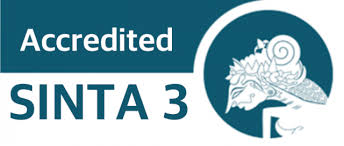
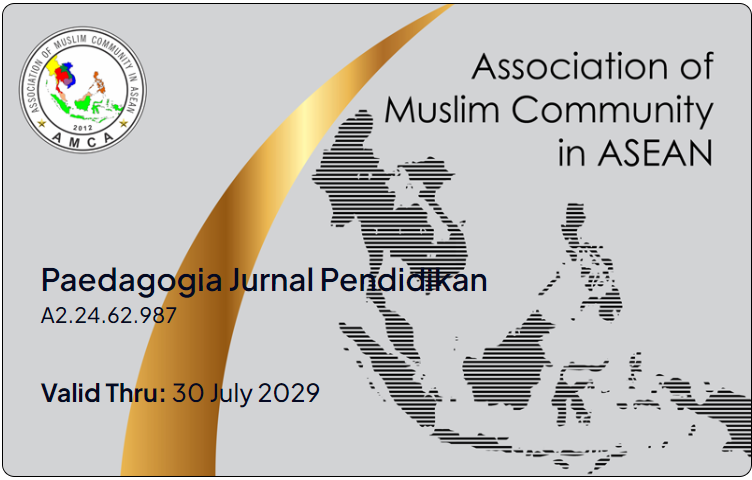


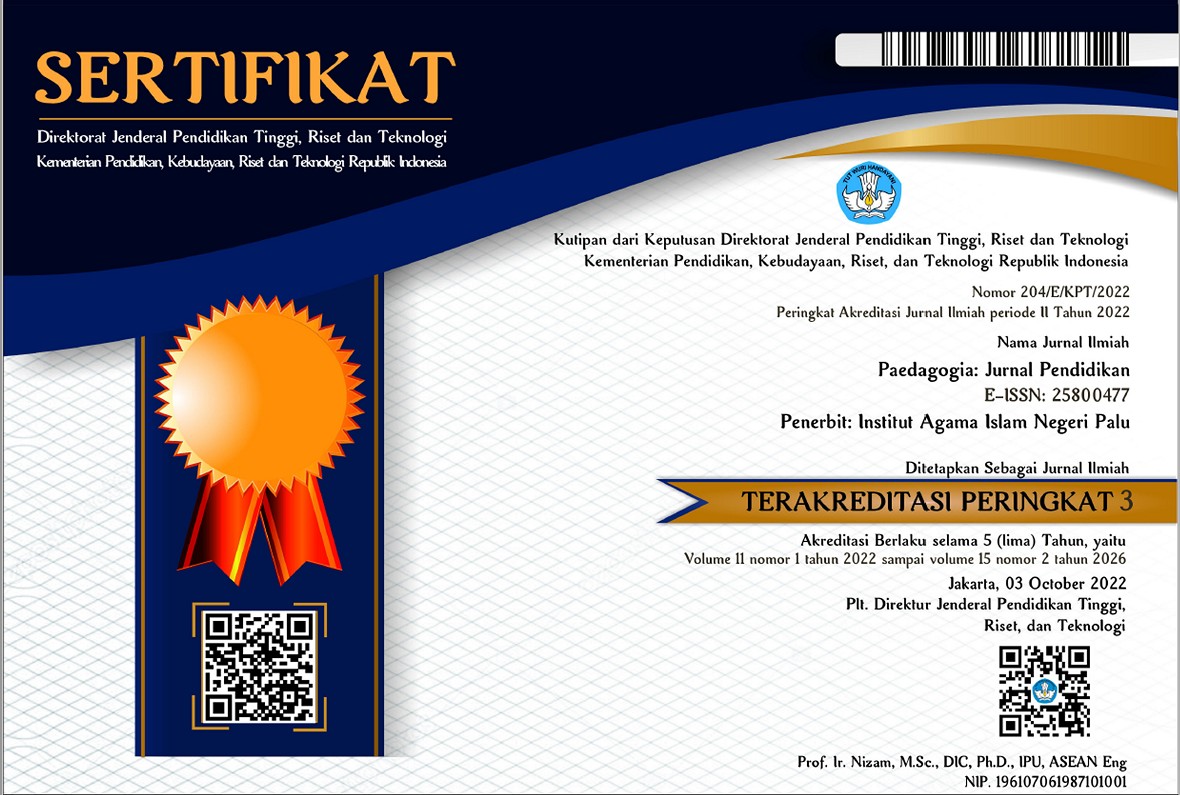

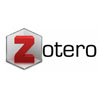
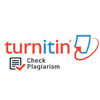

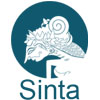








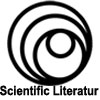
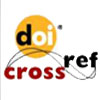







 This work is licensed under a
This work is licensed under a 